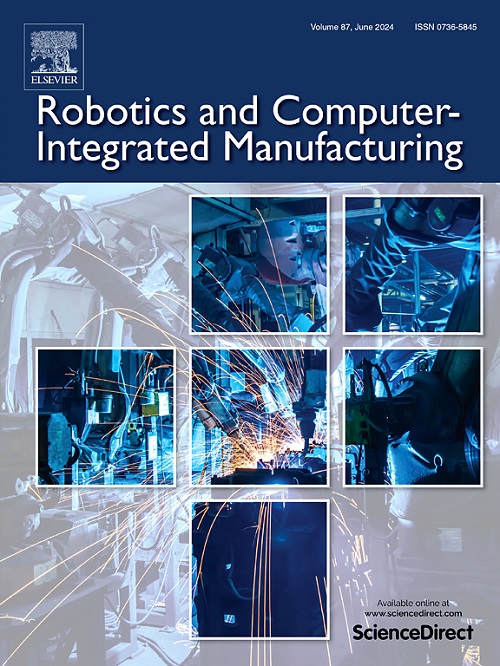A human-robot collaborative assembly framework with quality checking based on real-time dual-hand action segmentation
IF 11.4
1区 计算机科学
Q1 COMPUTER SCIENCE, INTERDISCIPLINARY APPLICATIONS
引用次数: 0
Abstract
This paper presents a human-robot collaborative assembly (HRCA) framework, addressing key challenges in real-time dual-hand action understanding, adaptive robot assistance, and in-process quality checking. At its core is DuHa-v2, a real-time dual-hand action segmentation algorithm that efficiently segments assembly actions of two hands by integrating object interaction and action features. DuHa-v2 enables robots to proactively assist human workers by utilising either next-task prediction or indicative action recognition, both informed by the segmented action sequences. An in-process quality checking mechanism is proposed to ensure high assembly quality and efficiency by identifying errors immediately after critical assembly steps. The framework's effectiveness is validated through experiments on both the HA-ViD dataset and a real-world case study, demonstrating superior dual-hand action segmentation performance, timely robot assistance, and effective quality checking. The proposed HRCA framework enables robots to collaborate with humans in a more intuitive and reliable way by providing timely assistance, whether or not the overall task is known, and performing in-time assembly quality checks. More information can be found in https://github.com/hao-zheng-research/A-human-robot-collaborative-assembly-framework-with-quality-checking.
基于实时双手动作分割的人机协作装配质量检测框架
本文提出了一个人机协作装配(HRCA)框架,解决了实时双手动作理解、自适应机器人辅助和过程质量检查方面的关键挑战。其核心是DuHa-v2实时双手动作分割算法,通过整合物体交互和动作特征,高效分割双手的装配动作。DuHa-v2使机器人能够通过利用分段动作序列来预测下一个任务或指示性动作识别,主动协助人类工人。提出了一种过程质量检查机制,通过在关键装配步骤后立即识别错误,保证装配质量和效率。通过在HA-ViD数据集和实际案例研究上的实验验证了该框架的有效性,展示了优越的双手动作分割性能、及时的机器人辅助和有效的质量检查。所提出的HRCA框架使机器人能够以更直观、更可靠的方式与人类合作,无论整体任务是否已知,都能提供及时的帮助,并及时执行装配质量检查。更多信息可以在https://github.com/hao-zheng-research/A-human-robot-collaborative-assembly-framework-with-quality-checking找到。
本文章由计算机程序翻译,如有差异,请以英文原文为准。
求助全文
约1分钟内获得全文
求助全文
来源期刊
CiteScore
24.10
自引率
13.50%
发文量
160
审稿时长
50 days
期刊介绍:
The journal, Robotics and Computer-Integrated Manufacturing, focuses on sharing research applications that contribute to the development of new or enhanced robotics, manufacturing technologies, and innovative manufacturing strategies that are relevant to industry. Papers that combine theory and experimental validation are preferred, while review papers on current robotics and manufacturing issues are also considered. However, papers on traditional machining processes, modeling and simulation, supply chain management, and resource optimization are generally not within the scope of the journal, as there are more appropriate journals for these topics. Similarly, papers that are overly theoretical or mathematical will be directed to other suitable journals. The journal welcomes original papers in areas such as industrial robotics, human-robot collaboration in manufacturing, cloud-based manufacturing, cyber-physical production systems, big data analytics in manufacturing, smart mechatronics, machine learning, adaptive and sustainable manufacturing, and other fields involving unique manufacturing technologies.

 求助内容:
求助内容: 应助结果提醒方式:
应助结果提醒方式:


